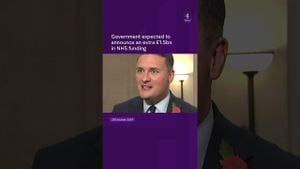International relations can sometimes feel like balancing on a tightrope, especially when new governments take the reins and foreign powers begin to weigh in on internal matters. For Bangladesh, under its interim government led by Chief Adviser Muhammad Yunus, the recent visit from UK's Minister for the Indo-Pacific, Catherine West, brings attention to this delicate situation. West's two-day visit, starting November 16, marked the first ministerial visit from the UK since the formation of the interim government back in August 2024, setting the stage for key discussions surrounding political, economic reforms, and humanitarian aid to the Rohingya.
West's agenda during her trip includes meetings with political leaders, business representatives, and civil society members—an effort aimed at deepening ties between Bangladesh and the UK. She emphasized the UK's support for the interim government's quest for political stability and economic growth, stating, "The UK supports the interim government’s work to build a more prosperous and democratic future for the Bangladeshi people."
Also high on the agenda is the continuing humanitarian crisis involving the Rohingya refugees, where the UK has committed to providing new funding for clean water, sanitation services, primary healthcare, and more. This assistance will extend to help Bangladeshis affected by recent natural disasters, showcasing the UK's multi-faceted approach to its relationship with Bangladesh. Sarah Cooke, the British High Commissioner to Bangladesh, highlighted this support, noting the long-standing friendship between the two nations. "Bangladesh is currently undergoing a transformation," she added, reitering the UK's commitment to facilitating political and economic reforms.
Meanwhile, as international attention shifts to Bangladesh, there are rising calls from Indian Americans for action against what they describe as increasing persecution of the Hindu minority under the interim government. Dr. Bharat Barai, a prominent Indian American leader, voiced the community's concerns during the recent Diwali celebrations at the US Capitol. Barai pointed out the need for the new Trump administration to address the situation, especially considering Trump's recent statements condemning violence against religious minorities. He described Trump's reaction as encouraging, expressing confidence the administration would act should abuses continue.
Dr. Barai's advocacy for decisive action includes suggestions for economic sanctions targeting Bangladesh's garment industry, which significantly drives the nation’s economy. He argued, "If their garment exports—which account for 80% of their business—are cut off, what will the people of Bangladesh eat?" His pointed remarks frame the interim government not merely as administratively inept, but as fundamentally subservient under military control.
With tensions stirring from both the UK and Indian American communities, the future of Bangladesh hangs precariously on the actions of its interim leadership and the international engagements surrounding it. The West has stated clear support for Yunus's administration, but there are concerns about the efficacy of this government amid reports of political unrest and human rights violations. Barai and other leaders from the Indian American community are determined to influence the new US administration and leverage their connections with Congress to address these pressing issues.
Barai emphasized the need for collaboration between the US and India, urging both nations to coordinate efforts if the situation does not improve, including imposing sanctions as leverage. He expressed optimism about international pressure achieving meaningful change, and how the voices of overpowering minorities could be amplified on the global stage.
Equally important to the fabric of these discussions is the humanitarian crisis involving Rohingya refugees. The plight of refugees who fled persecution has not only overwhelmed local communities but has also become intertwined with international diplomacy. According to West, new funding will not only provide immediate relief but is part of a broader strategy aimed at reaffirming the UK’s role as a key partner in tackling global challenges.
Pope Francis's introduction of the "Yunus 3Zero Club" launched just before West's visit highlights engagement with influential global leaders to build global cooperation and poverty reduction strategies. It aims to reshape economic planning for communities benefiting all sections of society, including refugees, showing the UK's commitment beyond mere political dialogue.
Despite positive steps forward, critiques of the interim government's effectiveness cut across various discussions. Observers remain skeptical about whether the interim administration can levy real political reforms without confronting the military's heavy influence over Bangladeshi society. The dire situation for Bangladesh's Hindu minorities and minor plot overlays questioning whether international assistance can penetrate through layers of state suppression.
Barai and others are committed to continuing their advocacy during Trump's presidency, positing him as capable of decisive intervention if provoked by the right political pressures. He heralded Trump as distinctly different from current leaders, alleging they have ignored the struggles faced by Hindus both domestically and abroad. Speculative claims about external influences complicate these narratives—Barai suggested conspiratorial twists involving liberal influencers on the political stability within Bangladesh, hinting at strategic ways to undermine nationalist agendas.
Consequently, the dual pressures from UK scrutiny and Indian American lobbying create a complex narrative for Bangladesh's interim government. With international relations intertwined with humanitarian needs and claims of minority persecution, the forthcoming months will be pivotal. Will the interim government manage to navigate these challenges and international scrutiny, or will it falter under mounting pressures? Only time will reveal the answers to these pressing questions, but organizations and communities remain vigilant, prepared to push for progress.



